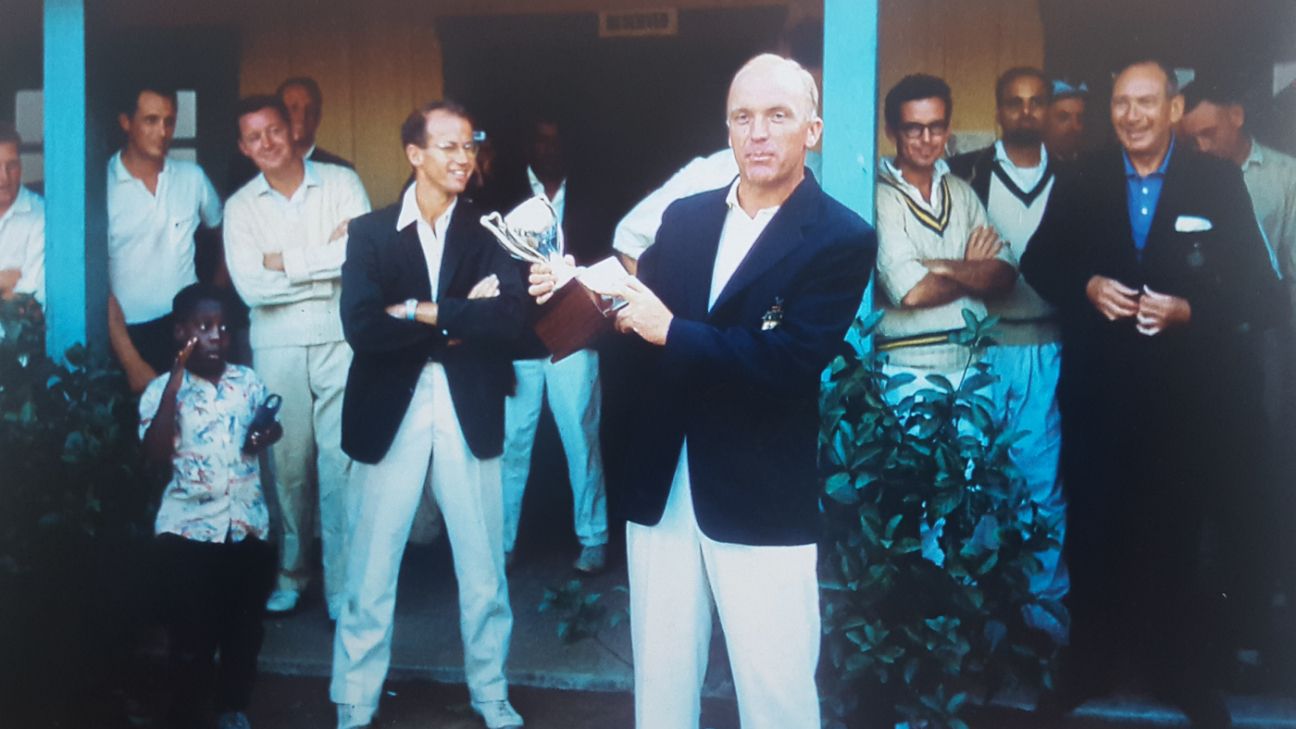Another of USA’s fine generation of cricket stalwarts in southern California is no more. Former USA captain and USACA president Jim Reid, who led USA to their first Auty Cup win in 54 years in 1966, died recently of complications from a stroke in southern California at the age of 91.
One of the post-war era’s most noteworthy servants of the game in the USA, Reid was an active member of the cricket community in Los Angeles after migrating there from England in 1957. Aside from captaining USA to the Auty Cup in 1966, Reid was an instrumental figure as an administrator serving as USACA president from 1978 to 1980, helping usher USA into the era of one-day cricket with their maiden appearance at the ICC Trophy in 1979.
Reid was born in Blackburn, England on December 26, 1926, the youngest of three children to Scottish immigrants. At the age of 15, he made his debut for East Lancashire CC in 1942 in the Lancashire League and played for 16 years at the club, primarily as an opening batsman.
That period was briefly interrupted by World War II, when he enlisted towards the end of the conflict in the British Royal Navy as a fighter pilot. He never saw combat, though his commanding officer during training was Horace Brearley, father of future England captain Mike, who allegedly told Reid he should go back home to focus on cricket rather than re-enlist when his initial service commitment had concluded.
Reid wound up playing eight times for the Lancashire Second XI, all as a 21-year-old in 1948, but never made it into the first team. According to his son, Reid was given the chance to play for the first team in a Roses match against Yorkshire, but turned it down because the money he made playing for East Lancs in the Lancashire League was better than what the County was offering.
“He had a job at a bank, but didn’t actually work at the bank. The manager was an East Lancashire cricket nut. He got a paycheck as an employee but he just played cricket,” said John Reid, Jim’s oldest son and a former USA batsman like his dad. “The game where he was supposed to play for Lancashire against Yorkshire in the first team, his boss put a bit of pressure on him to play for East Lancs.
“They had just as good crowds as Lancashire did and if he could make a century in a big game with a good crowd passing the hat around, he made more money in that game than he did in a whole year for Lancashire. He never played for Lancashire again after that. He never said it but I think he always regretted it.”
At the end of the 1957 club season, Reid had grown tired of life in England and started looking abroad for new work and living options with his pregnant wife Doreen. Their first preference was Canada, but their visa application was rejected because Doreen had tuberculosis.
The backup plan had been to go to Australia instead, but the Reids stopped off in Los Angeles along the way to visit Doreen’s sister and her husband, a former American GI who got together during the war. Jim fell in love with the place almost from the start and they never made it to Australia. Doreen’s sister and husband sponsored Jim and Doreen to stay in California and the rest is history.
“Doc Severn, father of Cliff, contacted my father and they went to a bar to have a drink and Doc was bowling to him in this bar,” John said. “My dad thought he was a nut. He got him to play a game with Britamer CC, the club Doc founded. He played a season with Britamer and after that fell in love with the cricket here. He always told me if he didn’t play cricket here, he would have gone back home. The cricket anchored him here and he loved southern California cricket.”
After the first year with Britamer, Reid moved on to Pasadena CC where he spent 15 years and eventually became club captain. The Reid connection to the Brearleys was re-established along the way. According to author P David Sentence in his book Cricket in America: 1710-2000, future England captain Mike Brearley played for Pasadena CC under Reid’s captaincy during the 1966 season while Brearley was doing post-graduate research work at University of California-Irvine. John says his dad hosted Mike at the family house in Glendale on several occasions as a way to rekindle the wartime bond between Reid and Brearley’s dad Horace.
It was also around that time in September 1966 that Jim Reid captained USA to a 58-run triumph in Los Angeles in the annual two-day Auty Cup match against Canada, the first time the USA had held the trophy since 1912. It was one of five appearances Reid made for the USA men’s team starting in 1963 before his brief international career for his adopted country came to an end in 1967.
“My dad told me when he played for the first team in England, he didn’t socialise much. The social aspect of cricket in Los Angeles, he loved it,” John said. “He was just happy being around all these people, a lot of them were Americans that were learning the game. It wasn’t as competitive as it was in England but after the game socialising with everyone, he loved that.”
Jim continued playing club cricket with Pasadena CC until 1973 and then afterward at University CC along with Dr. Tony Verity. He tried to balance his cricket with life as a real-estate appraiser in the Los Angeles, though Doreen never warmed to Los Angeles and the pair eventually divorced as she returned to England.
Jim remarried and had three more kids as he returned to the national cricket scene in 1978 in an administrative capacity as the president of the USA Cricket Association. It was during his tenure that USA competed for the first time in the ICC Trophy, which is now known as the World Cup Qualifier, in England in 1979.
“He would travel the country personally with his wife, my stepmom,” John said. “He would go to each of the four zones in the USA, the east zone, look at the games and the players to see if they were any good. No other president did that. He was never home. He was always flying around the country looking at different players.
“He didn’t want anyone on the team if he didn’t know. He had to see them and watch them play. He was very hands on like that. He knew what he wanted and got what he wanted. We only lost one game at that ICC Trophy against Sri Lanka and we should have beaten them. We had them on the ropes.”
The inability to get past Sri Lanka left a sour taste in Reid’s mouth. By 1980, he left as president of USACA and disappeared from cricket almost altogether, aside from sporadic appearances at Woodley Park in Los Angeles. In later years he suffered from dementia as well as a series of strokes, the last of which finally took his life on September 27. But his cricketing legacy lives on in southern California through his son John and countless generations of players at Pasadena CC, University CC and the rest of the Southern California Cricket Association.
“He loved playing for the US and leading the US,” John said.

